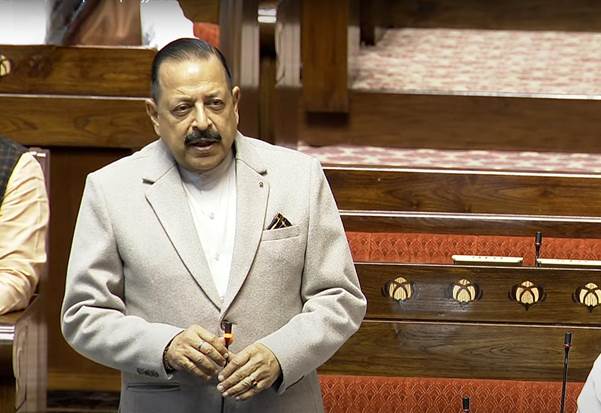Ministry of Science & Technology
“The GenomeIndia project, under Department of Biotechnology, ensures equitable representation in sample collection” says Science and Technology Minister Dr. Jitendra Singh
Approximately,36.7% of the samples were collected from rural, 32.2 % were from urban and 31.1 % were from the tribal populations informs, Dr. Singh
प्रविष्टि तिथि:
06 FEB 2025 3:42PM by PIB Delhi
Union Minister of State (Independent Charge) for Science and Technology; Earth Sciences and Minister of State for PMO, Department of Atomic Energy, Department of Space, Personnel, Public Grievances and Pensions, Dr. Jitendra Singh stated that approximately36.7% of the samples were collected from rural, 32.2 % were from urban and 31.1 % were from the tribal populations while answering the unstarred question in Rajya Sabha, today.
Dr. Jitendra Singh affirmed that In the Genome India project, equitable representation from rural, urban and tribal population was ensured.

The S&T minister also highlighted thatin order to achieve this goal, the researchers involved in GenomeIndia project faced some challenges, as outlined below.
- Geographic Accessibility: Reaching tribal remote regions to collect samples and gather data from these populations was difficult task.
- Cultural and Socioeconomic Barriers: Overcoming socioeconomic and cultural barriers and convincing such populations for their participation in the project was challenging.
- Lack of Awareness and Education: Rural and tribal populations are not having sufficient awareness of the benefits of genetic research, that led to misunderstandings about its purpose and value.Educating and convincing such populations was hard.
- Data Representation and Bias: Rural and tribal populations were not easily accessible and on the contrary, urban populations were often more accessible and had greater awareness. Hence, removal of bias by ensuring participation of appropriate proportions of all types of populations was important.
- Logistical Constraints: Insufficient accessibility to state-of-art healthcare infrastructure, laboratories, and skilled professionals in isolated regions made it challenging to collect samples and conduct blood parameter assessments.
Dr. Jitendra Singh further informed that the GenomeIndia Team followed pre-planned strategies to overcome various challenges. He stated, “Nearby logistics hubs were established for sample transportation, and laboratories were approached in advance to prepare resources for handling a higher number of samples.”
Additionally, partnerships with local healthcare institutions were formed to streamline data collection and improve accessibility. The involvement of local leaders and community representatives in interactions with rural and tribal populations helped mitigate cultural and socioeconomic barriers, build trust, and promote greater participation from these communities.
Outreach programs and community engagement initiatives were conducted to raise awareness about the importance of genetic studies and assure participants of data confidentiality, dispelling myths and clarifying the goals of the GenomeIndia Project. Moderated campaigns were organized to ensure balanced inclusion of diverse groups. Logistic constraints in isolated regions were effectively handled through systematic planning, he added.
****
NKR/ PSM
(रिलीज़ आईडी: 2100258)
आगंतुक पटल : 2396